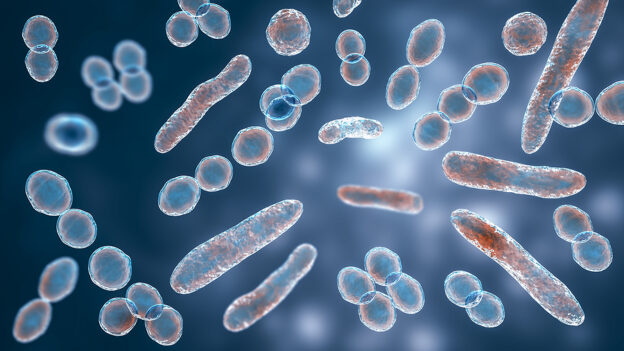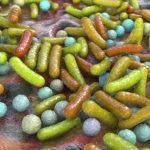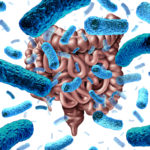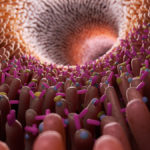By David Blyweiss, M.D., Advanced Natural Wellness
March 30, 2022
In the past 15 to 20 years, what we’ve learned about the importance of the human gut microbiome is amazing.
Before that, we spent a lot of time demonizing the bacteria, viruses, fungi and other microbes that hang out in our guts. We were wrong about so many things.
Back in the day…
We were at war against dirt. Now we know that kids who play outside and get dirty have more diverse gut microbiomes and build better immune systems than those who don’t. Infants who grow up with pets also have a higher diversity of microbes in their guts, a higher immune response and less chance of developing asthma and allergies. Same for kids growing up on a farm.
We thought the wombs of pregnant women were a sterile environment. But today we’re finding that the fetus is exposed to bacteria while still in the womb, and that the microbiome begins developing sometime during fetal development. So our initial microbiota basically starts out with whatever Mom had in her uterine microbiome. It passes from mother to child; and then with natural vaginal delivery the big boost on passing through the birth canal.
We handed out antibiotics with reckless abandon. All germs are bad, right? So it made sense to hand out an antibiotic whenever someone might have an infection, even a viral one that antibiotics have no efficacy against. Unfortunately, antibiotics disturb the delicate balance of your gut microbiota in a way that promotes obesity, metabolic disorders and autoimmune disease. Worse, overuse of antibiotics has resulted in a very serious worldwide public health problem: antibiotic resistance.
We were doing everything wrong, and now we are paying for it with our health.
MD Exposes the Hidden Danger to Your Eyes

When your eyesight starts to fail, it's a real problem. Suddenly you can't go to the grocery store... you can't get to the doctor if you have an emergency... you can't meet your friends for dinner…
Your "regular" doctor doesn't have time to keep up with the latest research. And the same goes for eye doctors. They go to school to learn how to fit you for glasses and contacts, but have no way of preventing the damage and loss of eyesight that threatens your freedom and independence.
Let me show you something that explains a LOT about how your eyes work.
In my FREE Special Report, I'll show you a HUGE, untapped resource for your eyes that safely and naturally restores clear, effortless eyesight.
Click here to get started...
How Important are the Bugs in Your Gut?
Thanks to advances in genome sequencing, we now know exactly how important all of those gut microbes are to our health.
The microbial community in our guts interact with virtually all human cells. It even has the ability communicate with your brain, and vice versa. It’s called the “gut-brain axis.”
For example, your gut bacteria manufacture about 90 percent of your body’s supply of serotonin. You’ve probably heard of this neurotransmitter before. Low levels of it are associated with stress, anxiety, depression and fatigue.
Your gut helps with the production of other brain chemicals too, like GABA, dopamine, norepinephrine and acetylcholine. All of these can affect your emotions, sleep patterns and stress levels.
So having plenty of “good” bugs in your gut can have a noticeable effect on your mental health and may even help you sleep better at night.
And did you know that those microbes can have an effect on your weight?
People who are overweight have specific changes in their microbiome that promote weight gain. But when people who are overweight change their microbiota with prebiotics and probiotics, they are able to lose weight and fat mass.
More importantly, serious health conditions like Ulcerative colitis and Crohn’s disease, irritable bowel syndrome, immune disorders, metabolic disturbances, depression, chronic fatigue, heart disease, reduced brain function and arthritis can be all linked back to your gut microbiota.
So basically, your gut microbiome influences all aspects of health. And it may just be the key to a happier, leaner and healthier life.
7 Ways to Restore a Healthy Gut Microbiota
The most powerful influence on the gut microbiome is what you eat.
The World's Quickest Solution for Ending Prostate and Urinary Misery
This has recently been revealed to be one of the only real breakthroughs in prostate health.
The seeds of a strange fruit (sometimes called "Chinese Apples") hold powerful phytonutrients that are a revolution in prostate health.
In fact, UCLA and Veterans Administration research have now proved this to be true.
Not only that, but it may be the worlds quickest solution for ending prostate misery.
Simply stated, these phytonutrients represent a huge step beyond beta sitosterol, saw palmetto, and other phytosterols alone.
Simply click HERE if you want to have fast prostate relief...restful, uninterrupted sleep...no more constant "urges to go"...enhanced virility...and optimal prostate support for life.
Artificial sweeteners. Commercial meats. Processed grains. Refined sugars. Dairy Products. Snacks. These are all common foods here in the U.S. It’s hard to avoid them. But every single one of them – and more – has a decidedly unhealthy effect on your gut microbes.
Here’s what I recommend:
Remove allergens like milk and wheat from your diet. If you aren’t a cow, why would you drink a cow’s milk? It’s a human allergen. And as far as wheat and other grains (such as barley and rye) are concerned, they contain gluten. Gluten triggers inflammation, alters the healthy balance of flora in your digestive tract and produces zonulin…a cause of “leaky gut”.
Avoid eating processed foods. This includes sugary, salty, fatty, fried foods and most products that come in a box or package. They will critically imbalance your gut microbiome in a few days!
Fill 85% of your plate with colorful fruits, vegetables and other plant-based foods. The enzymes in organic fruits, vegetables and beans promote the growth of healthy bacteria. In fact, people who eat the most of these foods have a much healthier diversity of gut microbiota.
Eat more fermented foods. They’re a great source of natural probiotics that feed your gut. Kimchi, miso, natto, kefir, tempeh and sauerkraut are all fermented foods.
Don’t eat conventionally raised meats and other animal products. These animals are dosed with antibiotics, so the drugs will pass along to you. Instead, opt for organic grass-fed, pasture-raised and wild-caught animal products and keep them to a maximum of about 15% of your overall diet.
Don’t take antibiotics unless they are absolutely necessary. They destroy whole populations of bacteria. This can change the balance of your immune system and decrease vitamin B production. NSAID pain relievers, proton pump inhibitors, antibiotics and other medications can also ruin your microbiota.
Add a good probiotic to your daily regimen. Look for a formula that contains a prebiotic along with lactobacillus, bifidobacteria and other strains of healthy bacteria. The higher the colony count, and the more live strains involved, the better off you’ll be. Just make sure to take it at bedtime.
Remember. If you look after your gut, it will look after you!
SOURCES:
Roslund MI, Puhakka R, Grönroos M, Nurminen N, Oikarinen S, Gazali AM, Cinek O, Kramná L, Siter N, Vari HK, Soininen L, Parajuli A, Rajaniemi J, Kinnunen T, Laitinen OH, Hyöty H, Sinkkonen A; ADELE research group. Biodiversity intervention enhances immune regulation and health-associated commensal microbiota among daycare children. Sci Adv. 2020 Oct 14;6(42):eaba2578.
Gupta S. Microbiome: Puppy power. Nature. 2017 Mar 29;543(7647):S48-S49.
Stinson LF, Boyce MC, Payne MS, Keelan JA. The Not-so-Sterile Womb: Evidence That the Human Fetus Is Exposed to Bacteria Prior to Birth. Front Microbiol. 2019 Jun 4;10:1124.
Ferranti EP, Dunbar SB, Dunlop AL, Corwin EJ. 20 things you didn’t know about the human gut microbiome. J Cardiovasc Nurs. 2014;29(6):479-481.
Strandwitz P. Neurotransmitter modulation by the gut microbiota. Brain Res. 2018;1693(Pt B):128-133.
Davis CD. The Gut Microbiome and Its Role in Obesity. Nutr Today. 2016;51(4):167-174.
John GK,. Dietary Alteration of the Gut Microbiome and Its Impact on Weight and Fat Mass: A Systematic Review and Meta-Analysis. Genes (Basel). 2018;9(3):167.
Durack J, Lynch SV. The gut microbiome: Relationships with disease and opportunities for therapy. J Exp Med. 2019;216(1):20-40
Bull MJ, Plummer NT. Part 1: The Human Gut Microbiome in Health and Disease. Integr Med (Encinitas). 2014;13(6):17-22.
Davis SC, Dosonmu-Ogunbi ABO, Dosunmu-Ogunbi SO, Barrow SD, Robertson BK. Understanding the Nutritional Needs of the Gut Microbiota. J Hum Nutr Food Sci. 2016;4(1):1079.
Maier L, Pruteanu M, Kuhn M, et al. Extensive impact of non-antibiotic drugs on human gut bacteria. Nature. 2018;555(7698):623-628.







